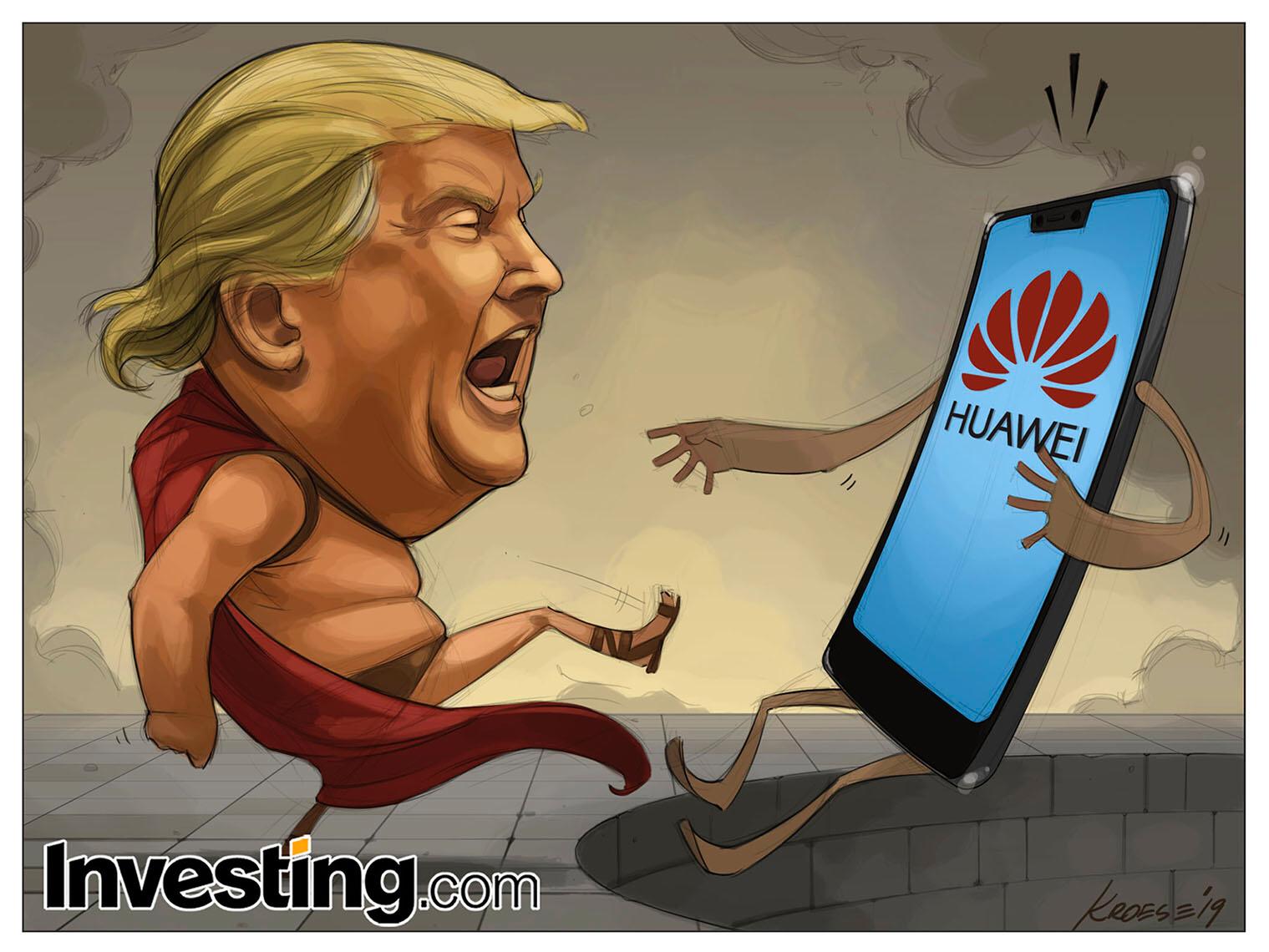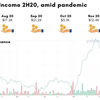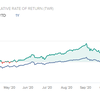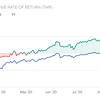Navigating the Trade War Between US and China
Thanks to Trump's indomitable will, the markets have been thrown into chaos for the past year with no breakthrough in sight. How can a fundamental investor navigate the waters and position ourselves to make money? In the next few weeks, I seek to answer 3 key questions that every investor should be thinking about right now:
- Do we remain invested?
- Which sector is best?
- Who is the winner?
Do we remain invested?
People often quote Warren Buffett but never truly understand how to apply his principles in investing. The first thing we have to understand as investors is that the market is dynamic, and every cycle is unique; what's important is your ability to analyse the facts and weigh the risks before you proceed. So, when Warren Buffett said "Be fearful when others are greedy and greedy when others are fearful", what does he really mean? In a greedy bull market, at what point do you say enough is enough and get out? When Buffett says to be fearful, does he mean we should have the fear of missing out? Some funds prefer to drown out the noise and follow a rational, quantitative strategy - you can't go wrong if you just follow the trend, right? But as a fundamental investor, we should seek to predict the trend, and the only way to do so is to have a view, a conviction.
So here's my view on the US-China trade war (I'll operate under the assumption that our readers here are already up to date with the specifics):
For the longest time, it has been the DNA of US tech companies is to be in creme de le creme of the value chain. Apple is a classic example - they have not manufactured a single thing in the entirety of the company's history, all the components and final assembly of the iPhone is built in South Korea, Taiwan, and of course China. The simple reason is creating software and designing hardware gives you the highest margins, it is completely asset-light (high recurring FCF generation), and by diversifying your supply chain, you actively reduce your R&D burden and increases your bargaining power with suppliers. We often see Apple's suppliers make razor thin margins, spend millions on R&D only to fail to make the cut as the next supplier, and deal with inventory problems as they expand too fast on production capacity only to be disappointed with low purchase orders. Yet, these companies are only able to do that because 1. labour is cheap in China (workers are literally begging to work over-time to get extra pay), 2. the logistics network has been perfected over the last decade and manufacturers have found a way to increase cost-efficiency in any way possible, and well, 3. the US doesn't want to deal with all the environmental pollution that comes with manufacturing so let's have someone else do the dirty work. The proof is in the pudding - Apple has sustained a ~40% gross margin since the dawn of day, while other smartphone companies are still making a meager 5-10%. Apple is only one of many examples, we can look no further from America's iron grip on the Semiconductors industry (US owns 100% of the global CPU market with Intel & AMD).
Yet, Trump's tariffs is a regressive policy that will destroy the benefits of such globalization - any production relocation will take time (just setting up a factory could take 6-12 months) and all the cost-benefits for US companies discussed above will pretty much be moot. Some components manufacturers I've talked to in my time admittedly would rather take on a 25% tariff than move their production base out of China. So what is Trump thinking by imposing tariffs? What good comes out of relocating manufacturing to the US, and does it really create more jobs? Is toiling away in a factory the American dream? Furthermore, other players like Samsung assemble their smartphones in Vietnam/India, while Huawei hardly has any market share in the US so the tariffs will only serve to graze their ego. Way to go at leveling the playing field for everybody else, Trump. However, when the tariffs on China were announced - the US conveniently put Apple in the tariff-free category. On the surface, Trump may be threatening to throw all of us back into the stone age, but it is clear he knows what he's doing. Protectionism is well and alive.
So that tariffs are clearly not an effective way to shut down China - China could simply slap retaliatory tariffs, costs will increase for consumers globally, demand slows down and so does the economy. Furthermore, while tariffs can fuel the US budget for fiscal spending or tax cuts to cushion the impact, they ultimately follow the law of diminishing marginal returns - as the trade deficit between US-China closes, so does the tariffs collected, and now you need the Fed to cut interest rates to prevent a recession. What a complete waste of everybody's time.
What do you do when your Plan A doesn't work? Go to Plan B. The US announced in May that Huawei (China's crown jewel) will be blacklisted on the basis of undermining US national security. This really puts Huawei in a bind because the blacklist covers everything under the sun that has at least 25% US origin in their production/formulation. This means that 1. all US products/services are basically cut off from Huawei, 2. any product/service around the world that have some form of raw material / IP sourced from the US are also in play - violation of the blacklist could lead to similar sanctions imposed. So Huawei can't produce any network equipment or smartphones anymore, because 1. US controls pretty much all the key components (Intel, Qualcomm, Broadcom, Xilinx) that cannot be readily replaced by their Chinese counterparts. 2. US controls a lot of IP, so China can only dream about producing their own chips - EDA tools used for chip design supplied by Synopsys/Cadence are now cut off from Huawei, and ARM being unable to license their IP for Huawei's Application Processors limit them in the same capacity. 3. US is light years ahead in software, and Google's compliance means their Android OS which runs 80% of the world's smartphones is no longer available to Huawei in the form of key updates and apps like Gmail, Maps, YouTube etc. Make no mistake, Huawei's 1,000-strong team of software engineers has worked singularly and tirelessly to create their own OS (now dubbed HongMeng) even before the tariffs were in sight, to no avail.
When ZTE first got banned, many investors balked at the idea that it would implicate Huawei. Afterall, Huawei is a completely different beast than ZTE, controlling ~25% of the global networking equipment market, and also 13% of the global smartphone market share (and recently overtook Apple as #2) - choking Huawei would be the same as choking the growth drivers of US companies which have seen a steady increase in % revenue mix from China. No single company could snap up Huawei's market share that quickly, and China isn't going to just sit quietly while being roasted. Sure enough, China has announced their own blacklist, targeting any firms that fall under China's definition of engaging in "unilateralism and trade protectionism". Not to mention, China has a history making life difficult for any firms that don't abide by their law, such as imposing tough bureaucracy, compliance checks, outright export control / shutdown of operations. Winter is coming, and I wouldn't like to be Apple, Starbucks or FedEx, just to name a few. Oh, and has everybody forgotten that China controls 70% of the global supply of rare earths? Rare earths are essential to the production of key components such as Semiconductors and Batteries (no wonder China controls >50% of the global EV-battery supply chain, and is the world's No.1 producer of Electric Vehicles). China could very well go down the path of Mutually Assured Destruction (in short, MAD-ness) - if Huawei can't produce, so can't you, World.
However, let's cover all bases. If Trump's aim is to truly decouple the world from China, then someone must fill the void. If we look through our history books, the US has plenty of capacity to be self-sufficient, but they chose not to be. Case in point, the US has been a net importer of crude oil for 75 years until recently, and when they decided to become a net exporter, down came the oil price. If you think about crude oil as a precious and depleting natural resource, you'd want to keep as much of it for yourself as possible. The US soil has enough oil reserves saved up over the years for them to be the last man standing. We could apply the same logic with rare earths - the US was the leading global producer of rare earths from the 1960s to 80s before they shifted out, and current domestic production is only 1% of what the US is capable of. Talk about planning ahead. This current model will work in the favour of the US indefinitely, why risk it now?
Again, we keep in mind that Trump has shown willingness to make tactical adjustments to his game - Huawei has been given a 90-day reprieve on the ban, and with that China has been holding back on opening Pandora's box.
So Plan B isn't the best idea, how about Plan C? The Trump administration has stepped up efforts on restricting academic visas and increasing scrutiny on Chinese researchers working in the US. China fires back and issues travel restrictions to citizens travelling to the US, and we are already seeing a decline in revenues for US consumer companies such as PVH Corp. or Tiffany & Co. What's next? Does Trump have a Plan D?
By now you should be seeing a pattern. Trump isn't fumbling in the dark, he's throwing more chips into this big game of chicken. These are negotiating tools to begin with, and his goal was never to close the trade deficit, or support the farmers (well 51% of his votes needed to come from somewhere, right?). The true aim is to cripple China, who has been growing at blinding speeds and spearheading innovation beyond the likes of US companies (Huawei in 5G, Alibaba in e-commerce, AI from start-ups like Megvii/SenseTime etc.), all on the back of "stealing" US IP, and having unfair trade practices such as giving domestic companies free subsidies, interest-free loans, tax rebates etc. Reading back-and-forth on the trade deal debate, it seems the Trump administration had wanted China to put in writing to block IP transfer of any sort, and ban outright government support to domestic companies - something China claims to infringe on their sovereignty (and let's be honest, Chinese firms would go out of business in a matter of days without the lifelines given by the government at the rate that they are burning cash). Then we take a step back, and we see Trump isn't just picking a fight with China, he's been slapping tariffs on everybody else - the EU, Mexico etc. In EU's case, to cripple Airbus which has been winning the duopoly with US Boeing with what Trump claims to be the help of subsidies from the EU (how about asking Boeing to stop driving their planes into the ground?). In Mexico's case, illegal immigrants and crime. So it is clear that the tariffs are just Trump's method of getting countries to give him what he wants. It's a terrible idea, but it's also the only one he's got.
Let's recap
- Trump doesn't want to plunge the world into recession.
- All is well if countries get bullied into a trade deal, America wins again.
- If Trump's big gamble doesn't pay off, he's quite likely willing to take a step back.
Then the issue here is that China isn't any other nation, and it sure isn't like the country it was 10 years ago. Since Xi's consolidation of power, he's given himself a lifetime on the iron throne. While Trump has limited time, even on the assumption that he gets re-elected in 2020, Xi can outlast him thanks to a convenient constitutional revision. Furthermore, the Chinese economy has never been stronger on the back of Xi's anti-corruption campaign and nationwide book-cleaning / deleveraging. Fun fact: China is the largest creditor of US treasuries (17.3% of total foreign-owned debt), and the Chinese poured in US$46bn/29bn of FDI into the US during 2017/18 compared to the ~US$13bn the US invests into China each year. China has become a proud nation and its people have a strong sense of nationalism with an unrivaled control over money flows. In the long-run, China is on track to overtake the US in technology - the US graduates 50,000 engineers a year, while China is churning out 260,000. Why should China take a knee in a race they are poised to win? As Xi's latest visit to Jiangxi Province would imply, China's new 15-year "long march" has just begun, and it seems like Russia's coming along.
Ultimately, the likely scenario is that a trade deal will happen. Trump will concede on some points in the trade deal, and China would have given up a big chunk of their growth at the end of it. However, until then, there's no way of telling when it will happen - my best guess would be by end-3Q19, just as Trump prepares for his 2020 campaign. What does this means for us fundamentalists? If you haven't gotten out of stocks, take some pain and get out. By "get out", I mean everything - stocks, bonds, alternatives, nothing is safe until it is. If we just look back over our shoulder, we have another 15% downside to the recent low of Dec-2018, and that was before additional tariffs came into the picture. The silver lining, however, is that the storm should soon be over and you'll have plenty of time and upside to play catch up. For those who got out early, sit back, relax and enjoy the show. It's time to think about where you want to invest when the time is ripe.
Disclaimer: This post is the culmination of public information and progressive news reports, meant to reflect my personal course of action. Readers should take the time to fact check and review my arguments for themselves before following my recommendation.

MG
M. G. is a portfolio manager engaged in deep-dive analysis of company fundamentals and market cycles, achieving high return performance over both short-term and long-term periods. His technocentric focus allows him to identify companies with distinct competitive edge in the market or unique investment angles in a fast-changing era of innovation.
Follow











